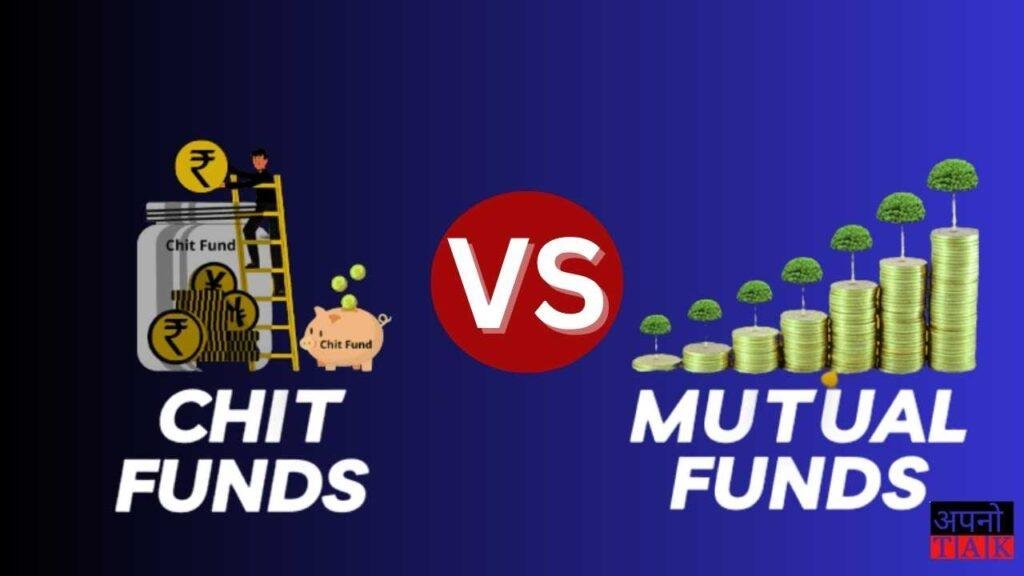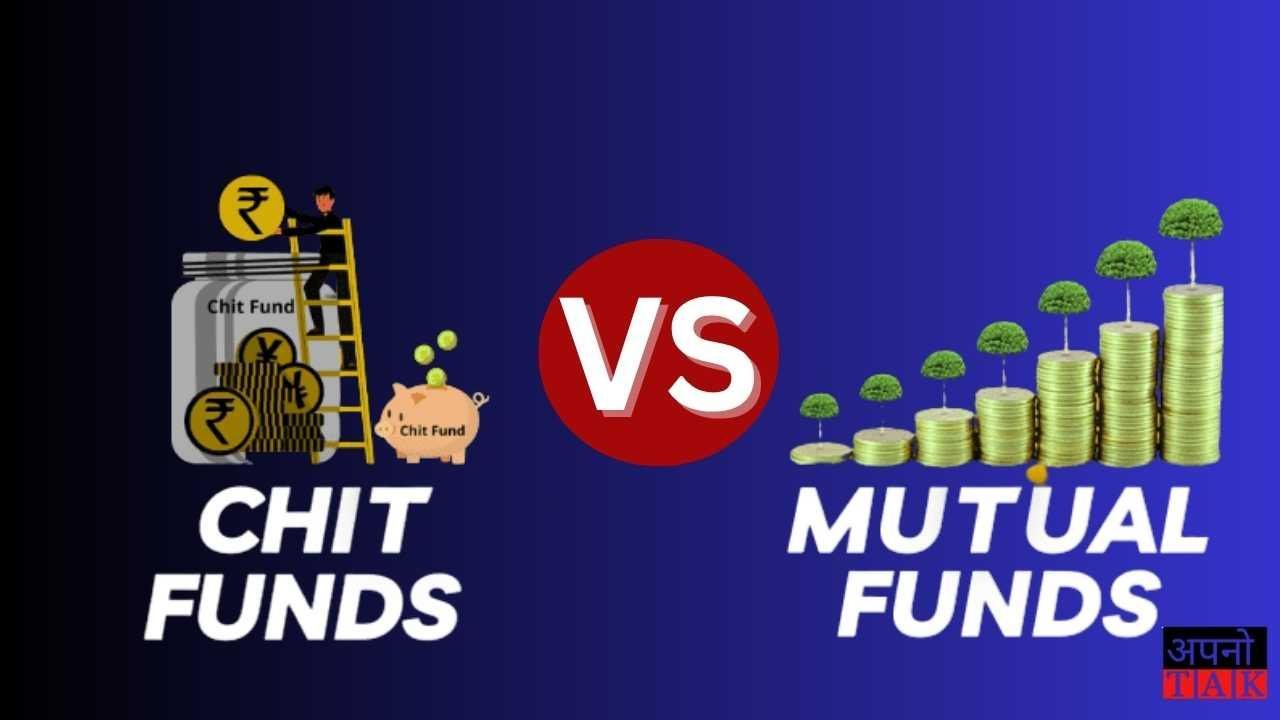Saving and investing money is a smart way to grow your wealth. But with so many options, it can be hard to choose the right one. Two popular choices in India are mutual funds and chit funds. Both are ways to pool money with others, but they work differently and serve different purposes. In this blog post, we’ll describe what mutual funds and chit funds are, contrast them, and assist you in deciding which may be appropriate for you. We’ll simplify it in easy English so everyone can understand.
What Are Mutual Funds?
Mutual funds are a common investment choice where lots of individuals pool money together to invest in shares, bonds, or other investments. The investments are managed by a skilled fund manager to increase the money in the long run. When you invest in a mutual fund, you purchase “units” of the fund, and their value fluctuates depending on how successful the investments are.
Mutual funds are perfect for individuals who wish to invest but lack the time or expertise to select stocks or bonds on their own. There are various kinds of mutual funds, such as equity funds (investing in stocks), debt funds (investing in bonds), or balanced funds (a combination of both). They are overseen by regulators such as the Securities and Exchange Board of India (SEBI), making them safer and more transparent.
The gains from mutual funds are market dependent. If the market performs well, you can gain good returns, but you can also lose money if the market plunges. You may begin with a minimal investment, even as little as ₹500, with a Systematic Investment Plan (SIP). Mutual funds are adjustable—you can take your money whenever you need it, although there can be a lock-in period or an exit load. They suit long-term objectives such as retirement, purchase of a home, or education.
Also Read: 5 Key Differences Between NSDL and CDSL Every Investor Should Know
What Are Chit Funds?
Chit funds are a conventional saving and lending mechanism in India. In a chit fund, a group of individuals contributes money each month into a collective fund. A different member receives the amount collected each month via a bidding system or a draw of lots. For instance, if 20 individuals contribute ₹1,000 per month, the total money is ₹20,000. One member receives the amount, but they continue to pay their share till the cycle of the chit fund is completed.
Chit funds are well known in rural India and among small business people who require access to money quickly. They are similar to a forced savings plan and a source of borrowing money without a bank loan. Chit funds, however, are riskier than mutual funds. Few chit funds are regulated, and some of the unregistered ones are frauds. Registered chit funds, regulated by the Registrar of Chits under the Chit Funds Act, 1982, are safer but have risks such as defaults if members do not pay.
The gains from chit funds are based on how much you bid or the rate of interest you pay to receive the amount in lump sum. If you receive the money sooner, it is like taking a loan; if you receive it later, it’s saving with some profit. Chit funds are less liquid than mutual funds—you cannot leave easily until the cycle matures.
Also Read: IEX share price jumps over 12% despite stock market crash; here’s why
Mutual Funds vs. Chit Funds

| Feature | Mutual Funds | Chit Funds |
|---|---|---|
| Definition | Pooling money to invest in stocks, bonds, etc. | Pooling money for savings and borrowing. |
| Regulation | Regulated by SEBI, transparent and safer. | Some regulated, others unregistered and risky. |
| Risk Level | Market-related risks, but diversified. | Higher risk, especially with unregistered funds. |
| Returns | Market-linked, 8-15% average (not guaranteed). | Depends on bidding, 4-12% effective returns. |
| Liquidity | Can withdraw anytime (some fees may apply). | Locked until the chit cycle ends. |
| Purpose | Long-term wealth creation. | Short-term savings or borrowing needs. |
| Minimum Investment | As low as ₹500 (SIP). | Varies, often ₹1,000 or more monthly. |
| Professional Management | Managed by experts. | No professional management, group-based. |
Conclusion
Mutual funds and chit funds are different from each other. Mutual funds are more suitable for someone who wants to build their money in the long run with professional handling at lower risk, particularly for long-term requirements.
Chit funds are better for individuals who require quick realization of a lump sum amount or like a systematic savings scheme for short-term requirements, but involve higher risks, particularly if unregistered.
Always do proper research—opt for SEBI-regulated mutual funds for security and registered chit funds if you decide to go in for them. The decision is based on your financial objectives, risk-taking capacity, and liquidity requirements.
Read More: Best Mutual Fund Plans for Children
Mutual Funds vs. Chit Funds: FAQ
1. Are mutual funds safer than chit funds?
Yes, mutual funds are generally safer because they are regulated by SEBI and managed by professionals. Chit funds, especially unregistered ones, can be risky due to potential fraud or defaults.
2. Can I lose money in mutual funds or chit funds?
Yes, mutual funds carry market risks, so their value can go down. Chit funds have risks like member defaults or mismanagement, especially in unregistered schemes.
3. How do I start investing in mutual funds?
You can start through a mutual fund company, bank, or online platforms like Groww or Zerodha. Complete KYC, choose a fund, and start an SIP with as little as ₹500.
4. How do I join a chit fund?
Join a registered chit fund company after verifying its license under the Chit Funds Act, 1982. Avoid unregistered chit funds to reduce the risk of fraud.
5. Which is better for short-term goals?
Chit funds may be better for short-term needs if you need a lump sum quickly. For long-term goals, mutual funds are a better choice due to their potential for higher returns.
Disclaimer:
The information in this post is for educational and informational purposes only and does not constitute financial, investment, tax, or legal advice. Always do your own research and consider your personal financial situation before making any investment decisions. The stock market carries risks, and past performance is not a guarantee of future results. If you are unsure, consult a qualified financial advisor or tax professional.









